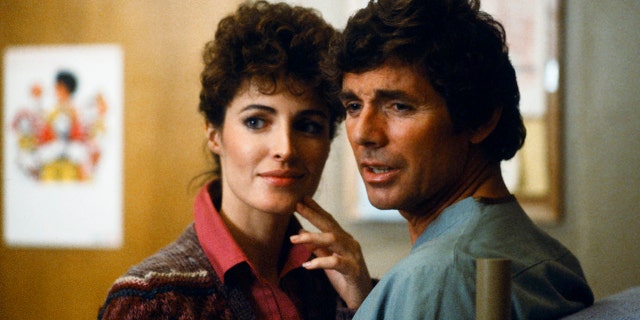NEWYou can now listen to Fox News articles!
David Birney, an actor who found early success on Broadway before landing the co-starring role on “Bridget Loves Bernie,” a 1972 sitcom that would be one of the most controversial TV shows of its era, died Friday of Alzheimer’s disease at his home in Santa Monica. He was 83.
His death was reported to The New York Times by his life partner, Michele Roberge.
Born in Washington, D.C., and raised in Cleveland, Birney had studied theater at UCLA when, in 1965, he began acting in regional theaters across the country, including the Barter Theater in Abingdon, Virginia, and the Hartford Stage Company in Connecticut.
In 1967, he performed in a New York Shakespeare Festival production of “A Comedy of Errors,” and in 1969 he made his Broadway debut as Cleante in Molière’s “The Miser.” In all, he appeared in seven Broadway productions through 1985, including “The Good Woman of Setzuan” (1970), “The Playboy of the Western World” (1971), “An Enemy of the People” (1971), “Antigone” (1971), “Amadeus” (1980) and “Benefactors” (1985).
HOLLYWOOD & MEDIA DEATHS IN 2022: PHOTO GALLERY
David Birney and Meredith Baxter starred in the CBS sitcom “Bridget Loves Bernie,” circa 1972.
(CBS via Getty Images)
Although he had small roles in a number of television series beginning in the late 1960s, Birney found his signature role in the short-lived “Bridget Loves Bernie,” a CBS situation comedy about the marriage of Jewish cab driver and writer Bernie Steinberg, played by Birney, and Catholic schoolteacher Bridget Fitzgerald, played by Meredith Baxter (the co-stars would marry in real life following the show’s cancellation).
The series was given pride of place on CBS’ famed Saturday night lineup, following “All in the Family” and preceding “The Mary Tyler Moore Show.” “Bridget Loves Bernie” became a ratings success, ranking second behind “Maude” among the new shows of the 1972-73 TV season and finishing the season tied for fifth among all primetime series.
But the comedy’s subject matter was protested by various Jewish groups, which criticized both what they saw as Jewish stereotypes and the show’s condoning of interfaith marriage. Although CBS never admitted to caving in to the protests, “Bridget Loves Bernie” was canceled after its debut season.
Birney followed up the series with various TV movies and series guest spots, making his biggest subsequent splash as John Quincy Adams in the 1976 series “The Adams Chronicles.” Also that year he starred in a short-lived TV adaptation of the 1973 film “Serpico.”

Annie Cavanero and David Birney in ‘St. Elsewhere’.
(Jack Hamilton/NBCU Photo Bank/NBCUniversal via Getty Images)
Other TV credits include appearances throughout the ’70s and ’80s in such series as “Family” and “The Love Boat” and the miniseries of Jacqueline Susann’s “Valley of the Dolls.”
His highest-profile post-Bernie role came in 1982, when he was a regular cast member during the debut season of NBC’s “St. Elsewhere.” He left the series after one season to appear in “Amadeus” on Broadway.
Birney’s TV career continued through the 1980s (“Glitter,” “Seal Morning”) and ’90s (“Murder, She Wrote,” “Live Shot,” “Star Trek: Deep Space Nine”). His last television credit was an appearance in 2007 in “Without a Trace.” He also continued working in regional theater, including in a play, “The Diaries of Adam and Eve,” he adapted from Mark Twain’s short stories.

David Birney during the filming of the made-for-television movie “Le Complot du Renard.”
(François Pugnet/Sygma via Getty Images)
One of his co-stars in a 1989 production of the Twain play was Baxter. In 2011, Baxter wrote in her memoir “Untied: A Memoir of Family, Fame and Floundering” that Birney had been abusive during their marriage, an accusation he denied in a lengthy public statement, calling Baxter’s claims “a fairy tale.”
In addition to Roberge, Birney is survived by daughters Kate and Mollie, son Peter (all three from his marriage to Baxter), a stepdaughter, stepson and other extended family.